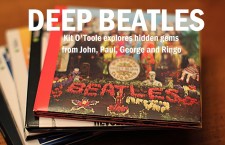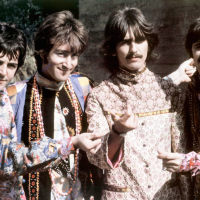The B-side to “All You Need Is Love,” “Baby You’re a Rich Man” stands as one of the Beatles’ most innovative, funky, and underrated tracks. Originally intended to accompany a segment of Yellow Submarine, the song instead surfaced on the 1967 Magical Mystery Tour soundtrack (although it never appears in the film). Its place on the former film soundtrack was restored in 1999, when a remastered version was included on the Yellow Submarine Songtrack collection. In addition to being one of the group’s more unusual tracks, “Baby You’re a Rich Man” also holds the distinction of being one of the fastest songs the Beatle ever recorded.
When the Beatles entered Olympic Sound Studios on May 11, 1967, they intended to record “Baby You’re a Rich Man” for the upcoming Yellow Submarine project. According to Kenneth Womack’s The Beatles Encyclopedia, the track resembles “A Day in the Life” in that it combines two previously separate song fragments: John Lennon’s verses with a Paul McCartney-composed chorus.
As Lennon told Rolling Stone, his words poked fun at the upper class. “The point was, stop moaning — you’re a rich man, and we’re all rich men, heh heh, baby!” he said. In a 1980 interview, Lennon further expanded on the song’s creation: “That’s a combination of two separate pieces, Paul’s and mine, put together and forced into one song. One-half was all mine. (sings) ‘How does it feel to be one of the beautiful people / Now that you know who you are …’ Then Paul comes in with, (sings) ‘Baby you’re a rich man,’ which was a lick he had around.”
While George Martin produced the session as usual, the engineers included Keith Grant and Eddie Kramer, both of whom would play large roles in the recording. Lennon sang lead vocal and played piano and the Clavioline, an early electronic keyboard with its own amplifier. It could produce one note at a time and imitate several instruments. McCartney contributed piano, bass, and backing vocals; George Harrison played lead guitar, tambourine and sang backing vocals; and Ringo Starr provided all percussion. Kramer even performed on the record, playing the Vibraphone.
Once the lineup was in place, the group first rehearsed before laying down 12 instrumental takes. The final attempt was deemed best, with McCartney then overdubbing a bass guitar part, Lennon adding his lead vocals, and McCartney and Harrison contributing their backing parts. Once Martin, Grant and Kramer created two reduction mixes, the second was chosen for Harrison to overdub his lead guitar and for Lennon to add the Clavioline introduction. More vocals, backwards piano, and Kramer’s Vibraphone were finally added, and the mono mix was completed. In all, the session lasted from 9 p.m. to 3 a.m. the following morning. According to Mark Lewisohn’s The Complete Beatles Recording Sessions, it was the first Beatles single to be recorded and mixed outside of Abbey Road Studios.
A mystery remains: did two Rolling Stones appear on “Baby You’re a Rich Man”? When Lewisohn searched the archives for his landmark book, he found two tape boxes labeled “+ Mick Jagger?” While Mick Jagger indeed attended the sessions, it is difficult to hear his voice anywhere on the record (although it is possible that he appeared during the shouted chorus toward the end). In addition, did Brian Jones play the oboe? Womack maintains that Jones appears on the record. Such a cameo appearance is plausible, as he infamously played on the Beatles track “You Know My Name (Look Up the Number)” just a week later.
Tape operator George Chkiantz told Lewisohn that Grant and Kramer were astounded by Lennon’s voice. “They’d long been wondering what it would be like to record and they couldn’t believe anyone could sing that well.” Indeed, Lennon does experiment with his voice, alternating between his usual range and falsetto.The lyrics can be seen as an inner argument, a dialog between the singer’s working class roots (falsetto) and later superstar status (natural range).
In the first verse the falsetto voices represent the “working class hero,” functioning as a Greek chorus. After asking the famous question “How does it feel to be one of the beautiful people?” they follow with “now that you know who you are.” But Lennon’s response suggests otherwise: “What do you want to be?” The chorus returns with the followup questions “How often have you been there?” and “What did you see when you were there?” In other words, they inquire whether the “beautiful people” really do lead more fabulous lives than so-called ordinary folks. Lennon’s voice takes on a flat quality when he answers the questions: “Often enough to know” and “Nothing that doesn’t show,” suggesting that reality does not live up to imaginings of the chorus. The responses are, in fact, rather boring.
The McCartney-written refrain, largely consisting of one note, repeats the title phrase and explains that the main character keeps his money in a “big brown bag / Inside a zoo.” This line recalls the miserly character Lennon would revisit in “Mean Mr. Mustard” (albeit that title character is far from rich). Harrison, Lennon, and McCartney decry the rich man’s greed. In the second verse, the Greek chorus again questions “Beatle John’s” newfound life and happiness. He is now “tuned to a natural E” and seems content. But since he has found the new key, Lennon asks himself, “What are you going to play?” Wealth and fame bring complications, and the narrator must decide how these elements will reshape his life. He has reached the “toppermost of the poppermost,” a cheer that he would recite to his bandmates in their early years. Now that he has achieved that goal, where does he go from here?
Another reading of “Baby You’re a Rich Man” has been that the lyrics represent Lennon’s disillusionment with manager Brian Epstein. As Womack points out, an oft-repeated anecdote claims Lennon chants homophobic and anti-semitic slurs during the song’s fadeout. So much shouting occurs — along with McCartney’s ad-libs — that it is virtually impossible to discern the words. Womack also states that the “beautiful people” phrase refers to the hippie generation, using then-contemporary slang.
While these are intriguing theories, the inner dialog and struggle with identity are consistent themes in Lennon’s compositions. “I’m a Loser,” “Nowhere Man,” “Help!” and “You’ve Got to Hide Your Love Away” are just a few examples. As he later admitted, Lennon struggled with fame and self-esteem issues during the filming of Help!, dubbing it his “fat Elvis period.” Thus, it is no stretch to read “Baby You’re a Rich Man” as the struggle between the “working class hero” and “Beatle John as well as his search for solutions to his increasingly turbulent life.
In addition to the confessional lyrics, “Baby You’re A Rich Man” succeeds because of McCartney’s pulsating bass, which is highlighted by Grant’s skillful engineering. Listening to the 2009 remastered version fully brings out the impressive and surprisingly soulful bass lines, and Grant should be commended for bringing out the booming sound. The reggae tinged “chuck chuck” of the guitar further accents the tempo, with Starr’s drums sounding particularly powerful on the track. The Clavioline provides continuity, as it furthers the Beatles’ ongoing experiments with world music. The notes lend a Middle Eastern quality, also underscoring the era’s psychedelic trends.
Overall “Baby You’re a Rich Man” hardly resembles any previous Beatles recording, demonstrating how the group’s experimental and avant-garde tendencies reigned during this period. They would move away from such sonic innovations on the White Album, thus the Magical Mystery Tour LP and “Baby You’re a Rich Man” serve as the last gasps of this artistic and inventive phase.
- The Rescued Early Paul McCartney Song That Completed ‘Beatles For Sale’ - December 4, 2024
- A Rare Beatles Cover Proves John Lennon Was Wrong About His Voice - November 26, 2024
- How John Lennon Came Roaring Back on the Beatles’ White Album - November 22, 2023




Thanks for the info and artifacts on this song. The homophobe and anti-semetic phrase was used in the title as Lennon was at times cruel to Epstein in his jokes, but Lennon did that to many of his friends and was also very loyal to Brian. I’ll spare the readers what the off track title was so as to no offend anyone.
actually, no…. this is in the yellow submarine film, but not in the magical mystery tour film. and the track that was restored for the film in 1999 was hey bulldog. just pointing it out for you – thnx!
Glad you mentioned the Bass line in the beginning of the song I always thought that Paul wanted to sound like a kettle with water boiling in it.